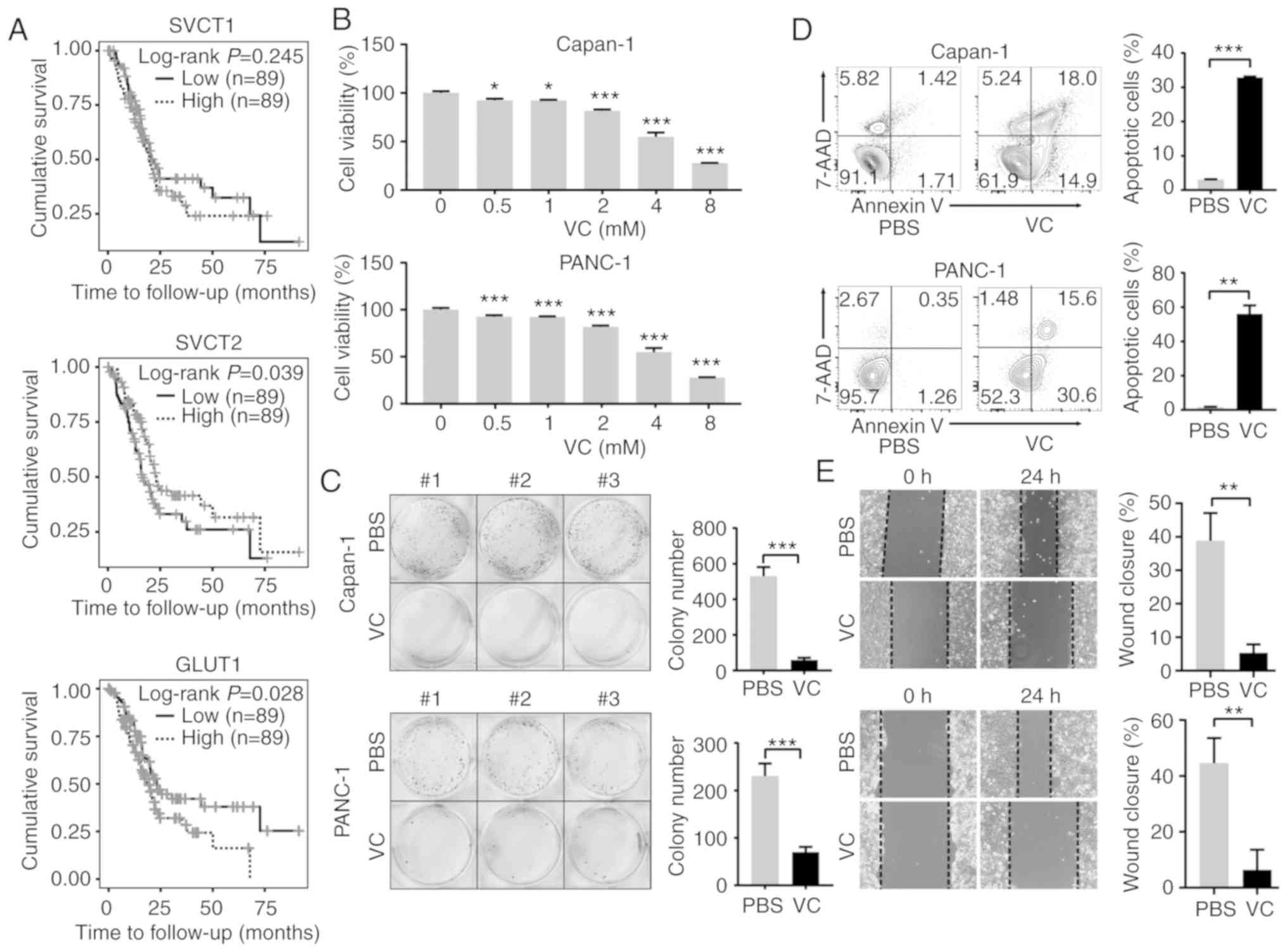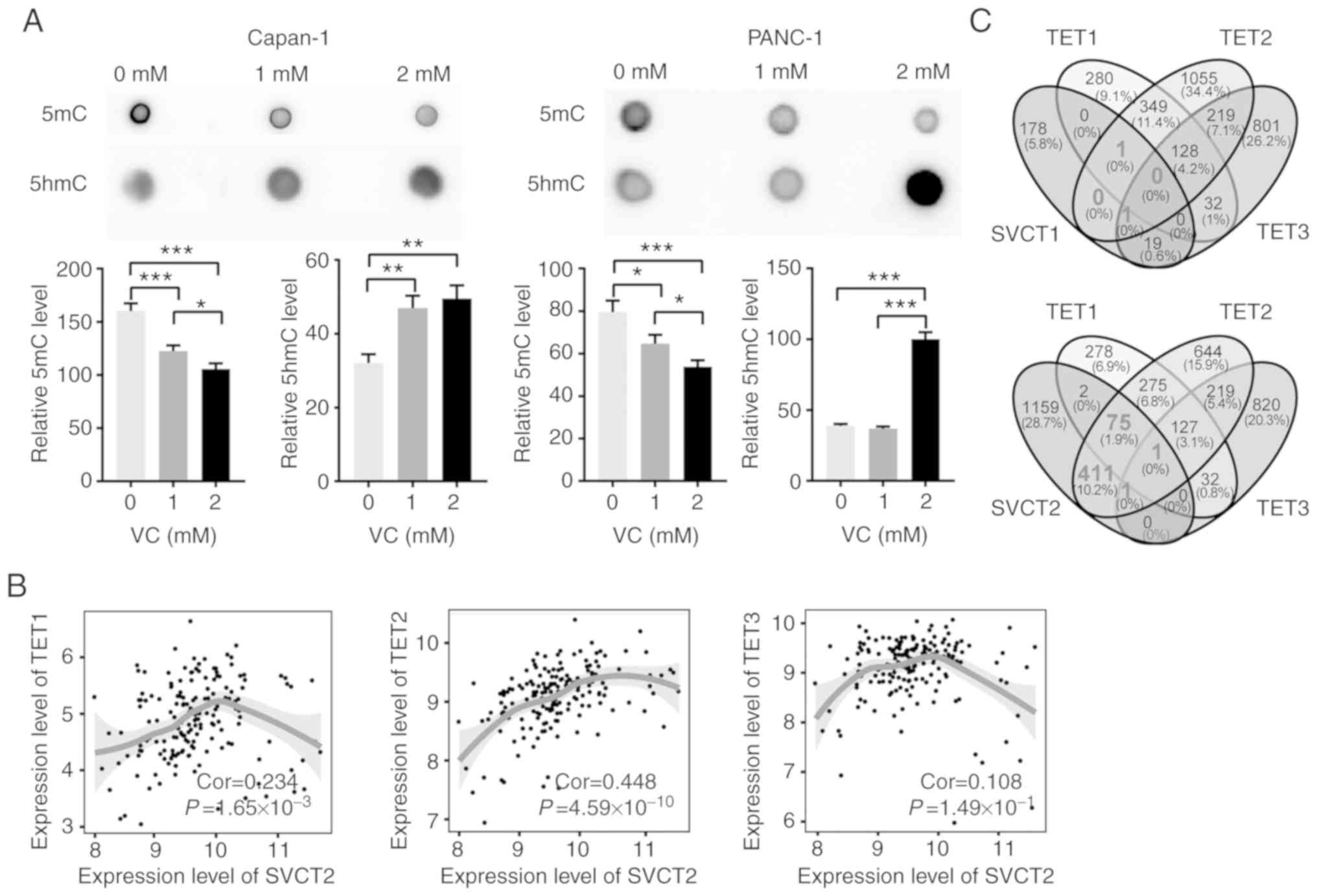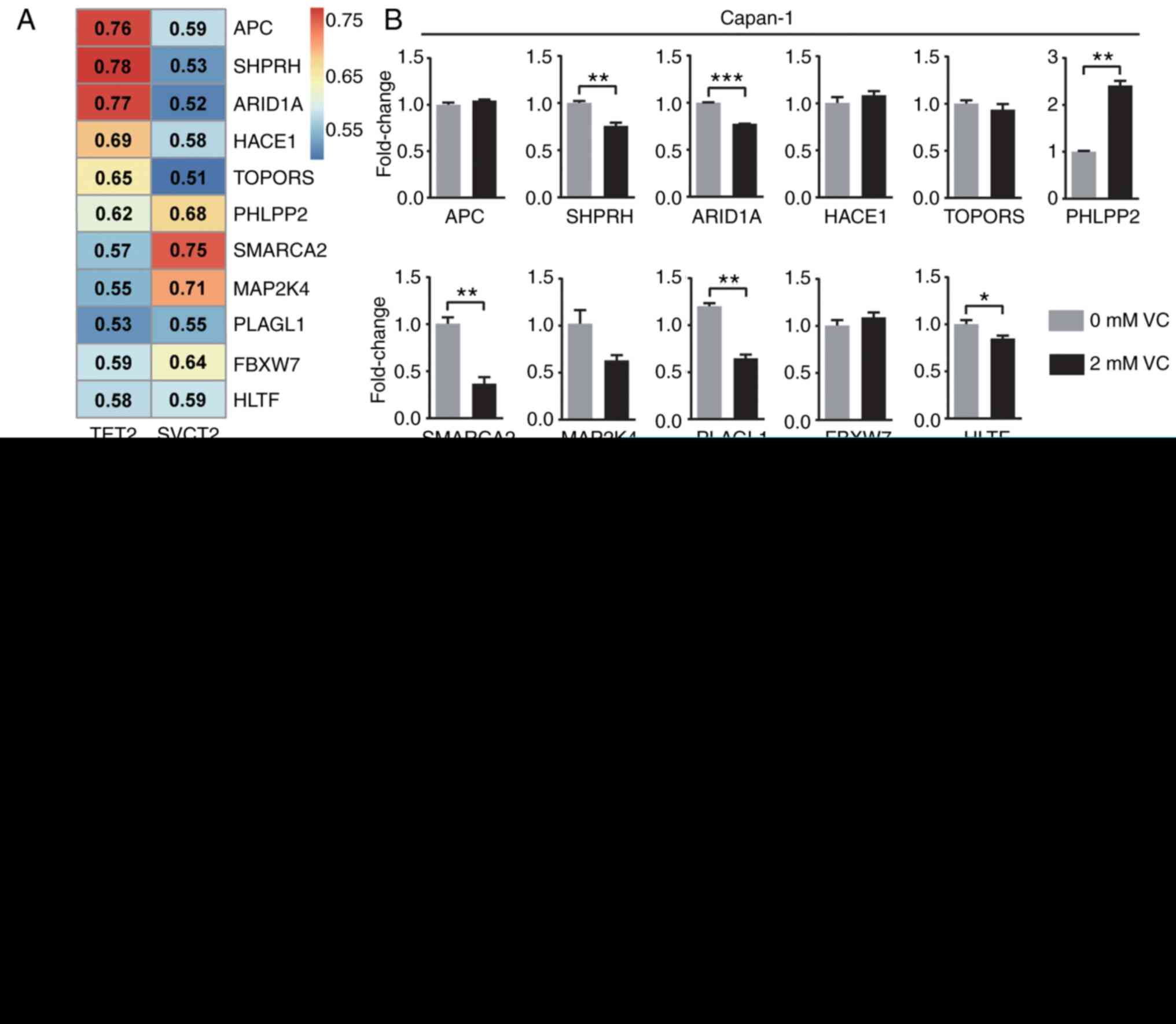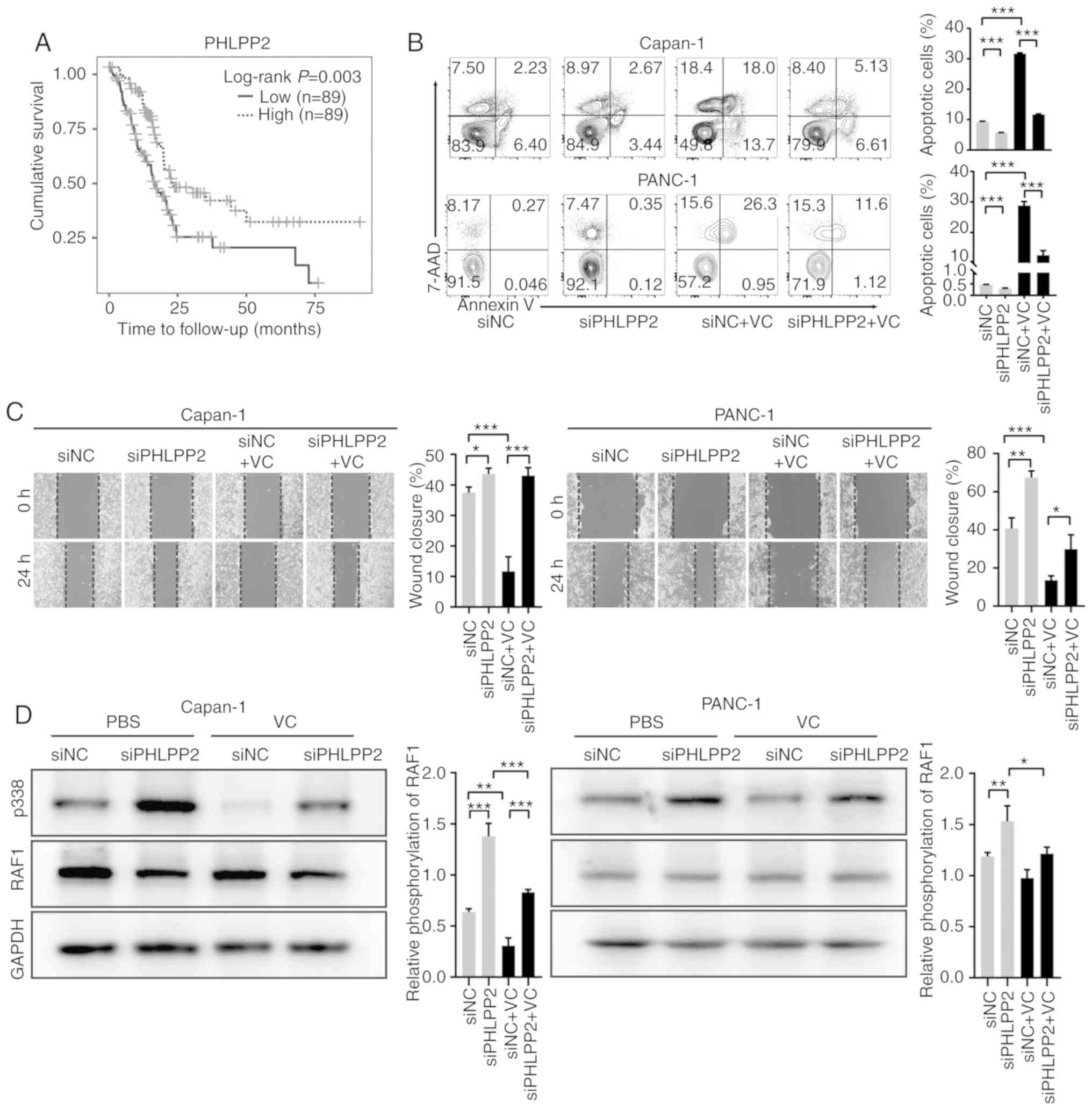|
1
|
Siegel RL, Miller KD and Jemal A: Cancer
statistics, 2019. CA Cancer J Clin. 69:7–34. 2019. View Article : Google Scholar : PubMed/NCBI
|
|
2
|
Siegel R, Naishadham D and Jemal A: Cancer
statistics, 2013. CA Cancer J Clin. 63:11–30. 2013. View Article : Google Scholar : PubMed/NCBI
|
|
3
|
Lee S, Kim J, Jung S, Li C, Yang Y, Kim
KI, Lim JS, Kim Y, Cheon CI and Lee MS: SIAH1-induced p34SEI-1
polyubiq-uitination/degradation mediates p53 preferential vitamin C
cytotoxicity. Int J Oncol. 46:1377–1384. 2015. View Article : Google Scholar : PubMed/NCBI
|
|
4
|
Vera JC, Rivas CI, Fischbarg J and Golde
DW: Mammalian facilitative hexose transporters mediate the
transport of dehydro-ascorbic acid. Nature. 364:79–82. 1993.
View Article : Google Scholar : PubMed/NCBI
|
|
5
|
Tsukaguchi H, Tokui T, Mackenzie B, Berger
UV, Chen XZ, Wang Y, Brubaker RF and Hediger MA: A family of
mammalian Na+-dependent L-ascorbic acid transporters. Nature.
399:70–75. 1999. View
Article : Google Scholar : PubMed/NCBI
|
|
6
|
McCarty MF: Expression and/or activity of
the SVCT2 ascorbate transporter may be decreased in many aggressive
cancers, suggesting potential utility for sodium bicarbonate and
dehydro-ascorbic acid in cancer therapy. Med Hypotheses.
81:664–670. 2013. View Article : Google Scholar : PubMed/NCBI
|
|
7
|
Kuiper C and Vissers MC: Ascorbate as a
co‑factor for fe‑ and 2-oxoglutarate dependent dioxygenases:
Physiological activity in tumor growth and progression. Front
Oncol. 4:3592014. View Article : Google Scholar
|
|
8
|
Mastrangelo D, Pelosi E, Castelli G,
Lo-Coco F and Testa U: Mechanisms of anti-cancer effects of
ascorbate: Cytotoxic activity and epigenetic modulation. Blood
Cells Mol Dis. 69:57–64. 2018. View Article : Google Scholar
|
|
9
|
Navada SC, Steinmann J, Lübbert M and
Silverman LR: Clinical development of demethylating agents in
hematology. J Clin Invest. 124:40–46. 2014. View Article : Google Scholar : PubMed/NCBI
|
|
10
|
Tahiliani M, Koh KP, Shen Y, Pastor WA,
Bandukwala H, Brudno Y, Agarwal S, Iyer LM, Liu DR, Aravind L and
Rao A: Conversion of 5-methylcytosine to 5-hydroxymethylcytosine in
mammalian DNA by MLL partner TET1. Science. 324:930–935. 2009.
View Article : Google Scholar : PubMed/NCBI
|
|
11
|
Ushijima T: Cancer epigenetics: Now
harvesting fruit and seeding for common diseases. Biochem Biophys
Res Commun. 455:1–2. 2014. View Article : Google Scholar : PubMed/NCBI
|
|
12
|
Rasmussen KD and Helin K: Role of TET
enzymes in DNA meth-ylation, development, and cancer. Genes Dev.
30:733–750. 2016. View Article : Google Scholar : PubMed/NCBI
|
|
13
|
Woods BA and Levine RL: The role of
mutations in epigenetic regulators in myeloid malignancies. Immunol
Rev. 263:22–35. 2015. View Article : Google Scholar
|
|
14
|
Minor EA, Court BL, Young JI and Wang G:
Ascorbate induces ten-eleven translocation (Tet) methylcytosine
dioxygenase-mediated generation of 5-hydroxymethylcytosine. J Biol
Chem. 288:13669–13674. 2013. View Article : Google Scholar : PubMed/NCBI
|
|
15
|
Yin R, Mao SQ, Zhao B, Chong Z, Yang Y,
Zhao C, Zhang D, Huang H, Gao J, Li Z, et al: Ascorbic acid
enhances Tet-mediated 5-methylcytosine oxidation and promotes DNA
demethylation in mammals. J Am Chem Soc. 135:10396–10403. 2013.
View Article : Google Scholar : PubMed/NCBI
|
|
16
|
Blaschke K, Ebata KT, Karimi MM,
Zepeda‑Martinez JA, Goyal P, Mahapatra S, Tam A, Laird DJ, Hirst M,
Rao A, et al: Vitamin C induces Tet-dependent DNA demethylation and
a blastocyst-like state in ES cells. Nature. 500:222–226. 2013.
View Article : Google Scholar : PubMed/NCBI
|
|
17
|
Cimmino L, Dolgalev I, Wang Y, Yoshimi A,
Martin GH, Wang J, Ng V, Xia B, Witkowski MT, Mitchell-Flack M, et
al: Restoration of TET2 function blocks aberrant self-renewal and
leukemia progression. Cell. 170:1079–1095.e20. 2017. View Article : Google Scholar : PubMed/NCBI
|
|
18
|
Lin JR, Qin HH, Wu WY, He SJ and Xu JH:
Vitamin C protects against UV irradiation-induced apoptosis through
reactivating silenced tumor suppressor genes p21 and p16 in a
Tet-dependent DNA demethylation manner in human skin cancer cells.
Cancer Biother Radiopharm. 29:257–264. 2014. View Article : Google Scholar : PubMed/NCBI
|
|
19
|
Gillberg L, Ø rskov AD, Liu M, Harsløf
LBS, Jones PA and Grønbaek K: Vitamin C‑A new player in regulation
of the cancer epigenome. Semin Cancer Biol. 51:59–67. 2018.
View Article : Google Scholar
|
|
20
|
Ngo B, Van Riper JM, Cantley LC and Yun J:
Targeting cancer vulnerabilities with high-dose vitamin C. Nat Rev
Cancer. 19:271–282. 2019. View Article : Google Scholar : PubMed/NCBI
|
|
21
|
Takemura Y, Satoh M, Satoh K, Hamada H,
Sekido Y and Kubota S: High dose of ascorbic acid induces cell
death in mesothelioma cells. Biochem Biophys Res Commun.
394:249–253. 2010. View Article : Google Scholar : PubMed/NCBI
|
|
22
|
Reddy VG, Khanna N and Singh N: Vitamin C
augments chemotherapeutic response of cervical carcinoma HeLa cells
by stabilizing P53. Biochem Biophys Res Commun. 282:409–415. 2001.
View Article : Google Scholar : PubMed/NCBI
|
|
23
|
Cha J, Roomi MW, Ivanov V, Kalinovsky T,
Niedzwiecki A and Rath M: Ascorbate supplementation inhibits growth
and metastasis of B16FO melanoma and 4T1 breast cancer cells in
vitamin C‑deficient mice. Int J Oncol. 42:55642013. View Article : Google Scholar
|
|
24
|
Baek MW, Cho HS, Kim SH, Kim WJ and Jung
JY: Ascorbic acid induces necrosis in human laryngeal squamous cell
carcinoma via ROS, PKC, and calcium signaling. J Cell Physiol.
232:417–425. 2017. View Article : Google Scholar
|
|
25
|
Su X, Shen Z, Yang Q, Sui F, Pu J, Ma J,
Ma S, Yao D, Ji M and Hou P: Vitamin C kills thyroid cancer cells
through ROS‑dependent inhibition of MAPK/ERK and PI3K/AKT pathways
via distinct mechanisms. Theranostics. 9:4461–4473. 2019.
View Article : Google Scholar :
|
|
26
|
Polireddy K, Dong R, Reed G, Yu J, Chen P,
Williamson S, Violet PC, Pessetto Z, Godwin AK, Fan F, et al: High
dose parenteral ascorbate inhibited pancreatic cancer growth and
metastasis: Mechanisms and a phase I/IIa study. Sci Rep.
7:171882017. View Article : Google Scholar : PubMed/NCBI
|
|
27
|
Welsh JL, Wagner BA, van't Erve TJ, Zehr
PS, Berg DJ, Halfdanarson TR, Yee NS, Bodeker KL, Du J, Roberts LJ
II, et al: Pharmacological ascorbate with gemcitabine for the
control of metastatic and node-positive pancreatic cancer (PACMAN):
Results from a phase I clinical trial. Cancer Chemother Pharmacol.
71:765–775. 2013. View Article : Google Scholar : PubMed/NCBI
|
|
28
|
Hoffer LJ, Levine M, Assouline S,
Melnychuk D, Padayatty SJ, Rosadiuk K, Rousseau C, Robitaille L and
Miller WH Jr: Phase I clinical trial of i.v. ascorbic acid in
advanced malignancy. Ann Oncol. 19:1969–1974. 2008. View Article : Google Scholar : PubMed/NCBI
|
|
29
|
Carr AC, Vissers MC and Cook JS: The
effect of intravenous vitamin C on cancer- and chemotherapy-related
fatigue and quality of life. Front Oncol. 4:2832014. View Article : Google Scholar : PubMed/NCBI
|
|
30
|
Espey MG, Chen P, Chalmers B, Drisko J,
Sun AY, Levine M and Chen Q: Pharmacologic ascorbate synergizes
with gemcitabine in preclinical models of pancreatic cancer. Free
Radic Biol Med. 50:1610–1619. 2011. View Article : Google Scholar : PubMed/NCBI
|
|
31
|
Drisko JA, Serrano OK, Spruce LR, Chen Q
and Levine M: Treatment of pancreatic cancer with intravenous
vitamin C: A case report. Anticancer Drugs. 29:373–379. 2018.
View Article : Google Scholar : PubMed/NCBI
|
|
32
|
Livak KJ and Schmittgen TD: Analysis of
relative gene expression data using real-time quantitative PCR and
the 2(-Delta Delta C(T)) method. Methods. 25:402–408. 2001.
View Article : Google Scholar
|
|
33
|
Vasaikar SV, Straub P, Wang J and Zhang B:
LinkedOmics: Analyzing multi-omics data within and across 32 cancer
types. Nucleic Acids Res. 46(D1): D956–D963. 2018. View Article : Google Scholar :
|
|
34
|
Li T, Fan J, Wang B, Traugh N, Chen Q, Liu
JS, Li B and Liu XS: TIMER: A web server for comprehensive analysis
of tumor‑infiltrating immune cells. Cancer Res. 77:e108–e110. 2017.
View Article : Google Scholar
|
|
35
|
Zhao M, Kim P, Mitra R, Zhao J and Zhao Z:
TSGene 2.0: An updated literature-based knowledgebase for tumor
suppressor genes. Nucleic Acids Res. 44(D1): D1023–D1031. 2016.
View Article : Google Scholar :
|
|
36
|
Subramanian VS, Srinivasan P and Said HM:
Uptake of ascorbic acid by pancreatic acinar cells is negatively
impacted by chronic alcohol exposure. Am J Physiol Cell Physiol.
311:C129–C135. 2016. View Article : Google Scholar : PubMed/NCBI
|
|
37
|
Waddell N, Pajic M, Patch AM, Chang DK,
Kassahn KS, Bailey P, Johns AL, Miller D, Nones K, Quek K, et al:
Whole genomes redefine the mutational landscape of pancreatic
cancer. Nature. 518:495–501. 2015. View Article : Google Scholar : PubMed/NCBI
|
|
38
|
Smith AJ, Wen YA, Stevens PD, Liu J, Wang
C and Gao T: PHLPP negatively regulates cell motility through
inhibition of Akt activity and integrin expression in pancreatic
cancer cells. Oncotarget. 7:7801–7815. 2016. View Article : Google Scholar : PubMed/NCBI
|
|
39
|
Zhang Z, Wang F, Du C, Guo H, Ma L, Liu X,
Kornmann M, Tian X and Yang Y: BRM/SMARCA2 promotes the
proliferation and chemoresistance of pancreatic cancer cells by
targeting JAK2/STAT3 signaling. Cancer Lett. 402:2132242017.
View Article : Google Scholar : PubMed/NCBI
|
|
40
|
Niu N, Lu P, Yang Y, He R, Zhang L, Shi J,
Wu J, Yang M, Zhang ZG, Wang LW, et al: Loss of Setd2 promotes
Kras-induced acinar-to-ductal metaplasia and epithelia-mesenchymal
transition during pancreatic carcinogenesis. Gut. Jul 11–2019.Epub
ahead of print. PubMed/NCBI
|
|
41
|
Grant RC, Selander I, Connor AA,
Selvarajah S, Borgida A, Briollais L, Petersen GM, Lerner-Ellis J,
Holter S and Gallinger S: Prevalence of germline mutations in
cancer predisposition genes in patients with pancreatic cancer.
Gastroenterology. 148:556–564. 2015. View Article : Google Scholar :
|
|
42
|
Newton AC and Trotman LC: Turning off AKT:
PHLPP as a drug target. Annu Rev Pharmacol Toxicol. 54:537–558.
2014. View Article : Google Scholar : PubMed/NCBI
|
|
43
|
Li X, Stevens PD, Liu J, Yang H, Wang W,
Wang C, Zeng Z, Schmidt MD, Yang M, Lee EY and Gao T: PHLPP is a
negative regulator of RAF1, which reduces colorectal cancer cell
motility and prevents tumor progression in mice. Gastroenterology.
146:1301–1312. e1–e10. 2014. View Article : Google Scholar : PubMed/NCBI
|
|
44
|
Shenoy N, Creagan E, Witzig T and Levine
M: Ascorbic acid in cancer treatment: Let the phoenix fly. Cancer
Cell. 34:7007062018. View Article : Google Scholar : PubMed/NCBI
|
|
45
|
Ge G, Peng D, Xu Z, Guan B, Xin Z, He Q,
Zhou Y, Li X, Zhou L and Ci W: Restoration of
5-hydroxymethylcytosine by ascorbate blocks kidney tumour growth.
EMBO Rep. 19:pii: e45401. 2018. View Article : Google Scholar : PubMed/NCBI
|
|
46
|
Cimmino L, Neel BG and Aifantis I: Vitamin
C in stem cell reprogramming and cancer. Trends Cell Biol.
28:698–708. 2018. View Article : Google Scholar : PubMed/NCBI
|
|
47
|
Yang H, Liu Y, Bai F, Zhang JY, Ma SH, Liu
J, Xu ZD, Zhu HG, Ling ZQ, Ye D, et al: Tumor development is
associated with decrease of TET gene expression and
5-methylcytosine hydrox-ylation. Oncogene. 32:663–669. 2013.
View Article : Google Scholar
|
|
48
|
Huang Y and Rao A: Connections between TET
proteins and aberrant DNA modification in cancer. Trends Genet.
30:4644742014. View Article : Google Scholar : PubMed/NCBI
|
|
49
|
Huang C, Liao X, Jin H, Xie F, Zheng F, Li
J, Zhou C, Jiang G, Wu XR and Huang C: MEG3, as a Competing
endogenous RNA, binds with miR-27a to promote PHLPP2 protein
translation and impairs bladder cancer invasion. Mol Ther Nucleic
Acids. 16:51–62. 2019. View Article : Google Scholar : PubMed/NCBI
|
|
50
|
Liu J, Eckert MA, Harada BT, Liu SM, Lu Z,
Yu K, Tienda SM, Chryplewicz A, Zhu AC, Yang Y, et al:
m6A mRNA meth-ylation regulates AKT activity to promote
the proliferation and tumorigenicity of endometrial cancer. Nat
Cell Biol. 20:1074–1083. 2018. View Article : Google Scholar : PubMed/NCBI
|
|
51
|
Nitsche C, Edderkaoui M, Moore RM, Eibl G,
Kasahara N, Treger J, Grippo PJ, Mayerle J, Lerch MM and Gukovskaya
AS: The phosphatase PHLPP1 regulates Akt2, promotes pancreatic
cancer cell death, and inhibits tumor formation. Gastroenterology.
142:377–387. e1–e5. 2012. View Article : Google Scholar
|
|
52
|
Nowak DG, Katsenelson KC, Watrud KE, Chen
M, Mathew G, D'Andrea VD, Lee MF, Swamynathan MM, Casanova-Salas I,
Jibilian MC, et al: The PHLPP2 phosphatase is a druggable driver of
prostate cancer progression. J Cell Biol. 218:1943–1957. 2019.
View Article : Google Scholar : PubMed/NCBI
|
|
53
|
Kuiper C, Vissers MC and Hicks KO:
Pharmacokinetic modeling of ascorbate diffusion through normal and
tumor tissue. Free Radic Biol Med. 77:340–352. 2014. View Article : Google Scholar : PubMed/NCBI
|


















